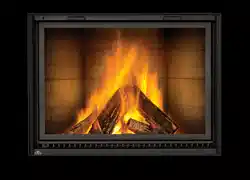Loading ...
Loading ...
Loading ...

EN
W415-1676 / E / 05.17.21
39
maintenance
9.2 creosote formation and removal
9.3 run-away or chimney fi re
9.0 maintenance
9.1 ash removal procedures
• Improper disposal of ashes results in fi res. Do not discard ashes in cardboard boxes, dump in back yards, or
store in garages.
• If using a vacuum to clean up ashes, be sure the ashes are entirely cooled. Using a vacuum to clean up warm
ashes could cause a fi re inside the vacuum.
!
WARNING
A bed of ashes approximately 1” (25mm) deep should be left on the fi rebox
bottom to help maintain a hot charcoal bed. When the fi re has burned
down and cooled, remove any excess ashes. To remove the ash, follow the
directions below. This appliance is equipped with pivoting andirons to allow
any ash removal.
1. After the last coal has extinguished, let the appliance cool at least two
hours.
2. Open the appliance doors.
3. Scoop the ash from the fi rebox into a metal container with a lid. Cover the
container and move the container away from the appliance onto a suitable
surface to ensure the ashes cool.
4. Dispose of the ashes.
Ashes should be placed in a metal container with a tight-fi tting lid. The closed container of ashes should be
placed on a non-combustible fl oor or on the ground well away from all combustible materials, pending fi nal
disposal. If the ashes are disposed of by burial or in soil or otherwise locally dispersed, they should be
retained in the closed container until all cinders have thoroughly cooled.
note:
When wood is burned slowly, it produces tar and other organic vapors, which combine with expelled moisture
to form creosote. The creosote vapors condense in the relatively cooler chimney fl ue or a slow-burning fi re. As a
result, creosote residue accumulates on the fl ue lining. When ignited, this creosote makes an extremely hot fi re.
The chimney connector and chimney should be inspected at least once every two months during the heating
season to determine if a creosote buildup has occurred.
If creosote has accumulated, it should be removed to reduce the risk of a chimney fi re.
!
WARNING
• A chimney fi re can permanently damage your chimney system. This damage can only be repaired by replacing
the damaged component parts. Chimney fi res are not covered by the lifetime limited warranty.
CAUSES:
• Using incorrect fuel, or small fuel pieces which would normally be used as kindling.
• Creosote build up in chimney.
• Leaving the door ajar too long and creating extreme temperatures as the air rushes in the open door.
• If equipped, burning your appliance with the ash plug not securely seated.
SOLUTIONS:
• Do not burn treated, painted, artifi cial, paper or processed wood logs, coal, charcoal, coloured paper or
cardboard.
• Have chimney regularly cleaned.
• Be careful not to over-fi re the appliance by leaving the door open too long after initial start-up. A
thermometer on the chimney connector and/or appliance top helps to indicate the appliance operating
temperature.
• If equipped, always operate the appliance with the ash plug properly installed.
Loading ...
Loading ...
Loading ...
